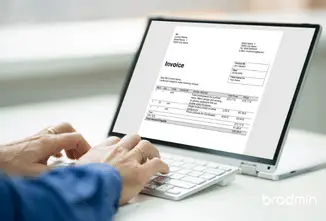When you have to deal with late payments, asking for payments professionally in a polite and direct approach can save a business relationship.
It would be best if you gave your clients the benefit of the doubt by first confirming that they received the Invoice before accusing them of non-payment, which would sever the relationship.
You could start sending emails requesting the confirmation and then gently reminding them to honour the invoice.
If the emails go unanswered, then you could consider talking to them by phone to get right into it and come up with an agreement.
However, all these plans are not guaranteed to work, and at times you may end up in court with your client over an unpaid invoice.
How do you politely ask for overdue payment?
Here’s how you can professionally ask your clients to pay their invoices.
How do you ask for payment on the due date?
The email sent on the due date is a simple, polite reminder, and it should be more direct on the action you will take when the Invoice is overdue.
You must, however, remain professional and polite. It would be helpful if the language you use focuses on the payment and not threats.
Make sure it is;
- Short
- Friendly
- Reminds them that they need to honour their promise
- Clearly explains how they can make the payments.
This email needs to be direct and to the fact that payment is required today. Do not add any other information to the email that might distract the client from the payment.
If the payment is overdue, should I charge the late payment fees?
It is never easy to make this decision, as it affects the relationship between you and your customer.
It is risky to charge late payment fees to clients who have probably been with you for a long time, but if the particular client tends to pay late, then you might have no other choice.
Small business owners and freelancers are especially vulnerable in this regard because running a business with multiple late invoices will impact their cash flows negatively and make it difficult to run their operations.
So, this is purely a business decision and must be made by the owners, as they must weigh the options of whether or not they are willing to lose the client.
Alternatively, if your business has a monopoly in the market, it may be a good idea to charge the interest fee as your clients are likely to stick with you no matter what happens.
What is a reasonable late payment fee to charge?
A reasonable late payment fee is usually a flat rate that is a percentage of the amount overdue.
Late payments typically create cash flow problems for the company, increasing the risk of not being paid at all.
Using your legal right to claim interest for late-paying customers may help encourage them to pay on time.
According to the law, you have a right to charge interest per the Bank of England’s base rate and add 8%.
For example, currently, the base rate for the Bank of England is 0.1%
This means that you would charge 8.1%
The rate of calculating interest is fixed over six months.
The base rate set on 31st December was used to calculate debts between 1st January and 30th June.
Calculating the interest due to you is a straightforward process, and here’s the step-by-step process;
Start by multiplying the total amount you are owed by the rate of interest you will charge. In this case, 8.1%.
For example, if you are owed £2,000, then the interest would be £2,000 X 8.1% = £162Next, calculate the daily interest by dividing this annual interest by the number of days 365
£162 /365 = 0.44
You would then work out the total amount due by multiplying the daily interest with the total number of days late.
For example, if the Invoice has been late for 30 days, then the total interest would be;
0.44 X 30 = £13.3
Therefore, the new invoice amount would be £1013.3.
Any part payment made by the client will go towards reducing the amount owed.
For example, if the client paid £2000 for the new bill, they would now owe £13.3. This is because the daily interest would now be accrued in addition to this amount.
The Amount Outstanding Will Also Change Per Day.
Each day, the amount keeps increasing by the interest amount, and it is good to be practical with the client about this to settle their debt.
How can I avoid late payments?
Late and overdue payments are something you will deal with for most of your career as a businessman/woman.
There are, however, some tips you can use to protect yourself against this scourge;
What is an LBA?
LBA – Letter Before Action. This is a letter usually written by your solicitor or collection agency. It is sent to inform them of forthcoming court action if the payment is not received in the next seven days.
Usually, it is a serious step for securing payment from the client, and if they do not follow the instructions, then legal proceedings can begin.
What is an LPD?
LPD – Late Payment Demand. This is an alternative to the LBA. It allows you to make an interest claim, compensation, and any other reasonable costs you may have accrued while collecting late payment.
The process of debt collection can be quite complicated for anyone who has also to run their business at the same time. You must deal with other customers and clients.
After making the initial contact, you could offer your debtor a chance to pay up the debt they owe you, and the best course of action is to recruit the services of a debt collection agency that will get things moving quickly and perhaps give you some good results in the end.
Wrap up!
Most businesses experience overdue payments, and if you haven’t dealt with this yet, you might be dealing with it soon.
If you feel uncomfortable chasing the payments, do not worry, it happens to everyone, but you must soldier through and do it as you need the money more than the client.
Please remember that you are protected by law when it comes to asking for your money. You cannot go wrong here.
Be direct, friendly, and professional because once the client pays, you may still wish to be in business with them, and severing this relationship could lead to losing a client.
At the end of the day, what should drive you to recover unpaid invoices is the amount of money and business opportunities you may be losing due to having your money tied up.
Additionally, you will be incurring more and more expenses for each day you try to collect on the overdue payment.





![Apology letter for late payment to supplier [with examples] 5 apology letter for late payment to supplier](https://brodmin.com/wp-content/uploads/2021/09/apology-letter-for-late-payment-to-supplier.webp)
![Invoice payment terms - UK edition 2022 [+ Net calculator] 6 Invoice Payment Terms UK Edition 2021](https://brodmin.com/wp-content/uploads/2021/09/Invoice-Payment-Terms-UK-Edition-2021.webp)





